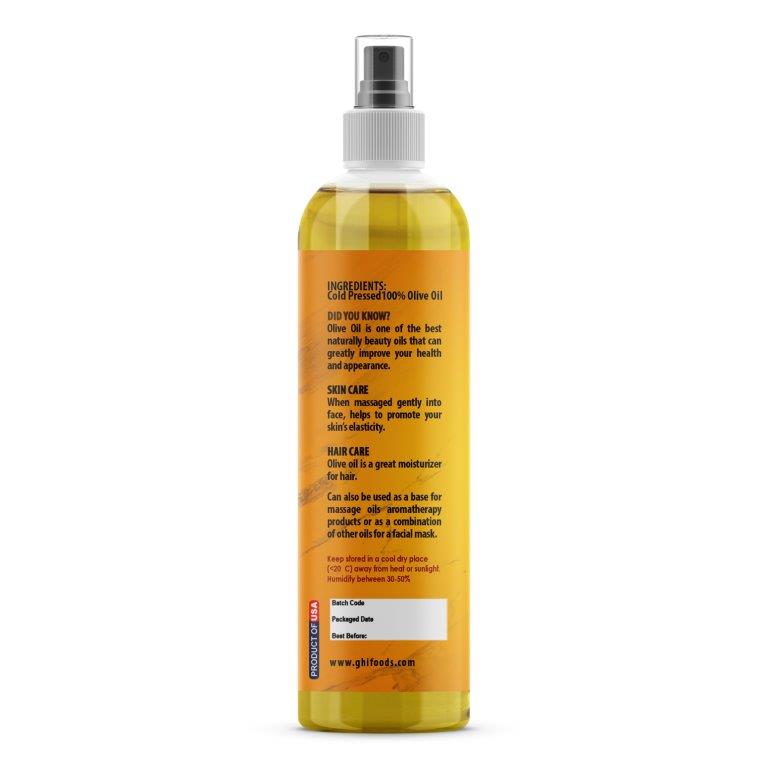Description
Olive oil is a fat obtained from the olive (the fruit of Olea europaea; family Oleaceae), a traditional tree crop of the Mediterranean Basin. The oil is produced by pressing whole olives and is commonly used in cooking, cosmetics, pharmaceuticals, and soaps, and as a fuel for traditional oil lamps. Olive oil is used throughout the world and is often associated with Mediterranean countries. Olive oil is popular for use in massaging infants and toddlers, but scientific evidence of its efficacy is mixed.
One analysis of olive oil versus mineral oil found that, when used for infant massage, olive oil can be considered a safe alternative to sunflower, grapeseed and fractionated coconut oils. This stands true particularly when it is mixed with a lighter oil like sunflower, which "would have the further effect of reducing the already low levels of free fatty acids present in olive oil". Another trial stated that olive oil lowered the risk of dermatitis for infants in all gestational stages when compared with emollient cream.
Another study on adults found that topical treatment with olive oil "significantly damages the skin barrier" when compared to sunflower oil, and that it may make existing atopic dermatitis worse. The researchers concluded that due to the negative outcome in adults, they do not recommend the use of olive oil for the treatment of dry skin and infant massage
Suggested Uses:
Eye Makeup Remover:
Put one or two drops of extra virgin olive oil on a cotton face pad and use it to remove your eye makeup at the end of the day. Gently remove your eye makeup without stretching and pulling the delicate skin around your eyes. As you use it, the olive oil works to soften the skin, especially when you use it as a makeup remover on a consistent basis.
Skin Elasticity:
Olive oil, when massaged gently into your face, helps to promote your skin's elasticity. You don't need to limit yourself to external use. Incorporate it into your diet, and your entire body will benefit from the nutritional effects.
Exfoliating Skin:
Mix extra virgin olive oil and sea salt together to make a natural exfoliant for your face, especially if you're suffering from scaly, dry skin. Massage this exfoliator into the areas of your face affected by dryness and scaliness. It works to get rid of the old, dry skin, revealing new, younger skin underneath.
Moisturizer:
Extra virgin olive oil penetrates deep into the skin on your face, providing needed moisture as well as a shield to protect your skin, keeping it smooth.
Oily skin:
Olive oil helps eliminate excess oil, although it sounds illogical. Applications of olive oil for oily skin works in two ways: they wash off impurities and they correct the natural oil production of skin. To improve your oily skin condition, you should follow the daily procedure of massaging the oil into skin and then rinsing it off with warm water. Homemade facemask and scrubs will intensify the effect.
Unhealthy skin:
Olive oil skin applications treat various skin problems, such as eczema, psoriasis, dermatitis, acne, dark spots, sunburns, scars and wounds. The healing properties of olive oil are much due to chlorophyll, found in the oil. Fatty acids with their antimicrobial properties combined with moisturizing natural antioxidant Vitamin E contribute to the faster improving of skin health.
There are different types of olive oil available on the market. The best choice would be organic extra-virgin olive oil.
Summary:
Eye Makeup Remover:
Skin Elasticity:
Exfoliating Skin:
Moisturizer:
Oily skin:
Unhealthy skin:
Ingredient: 100% Pure Extra Virgin Olive Oil.






